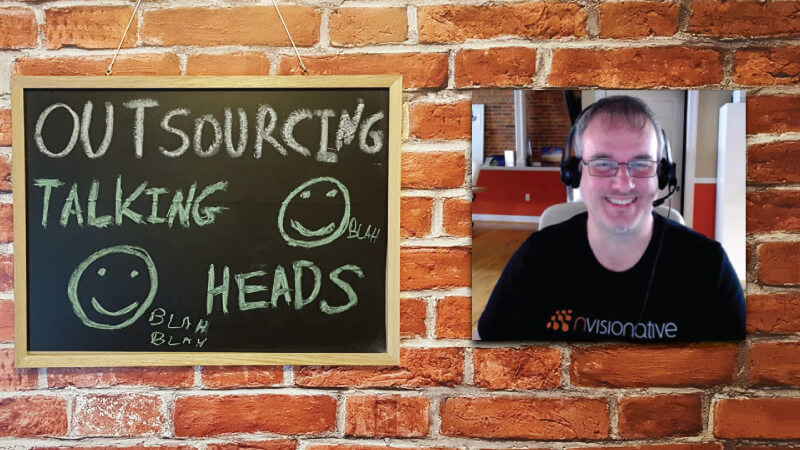
How has it been with Outsourcing and you? Are there tips and tricks you can share? A productive open conversation with David Pointdexter from nvisionative.com
Nvisionate is a full-service creative marketing agency from Mooresville, North Carolina, USA to the world. Meaning branding, corporate ID, advertising campaigns but also a strong tech component comprehending website/ mobile app and application development with focus on the marketing message and aesthetics; which differs significantly (for the better) from outsourcing such services to a “traditional”, merely technical provider who does not look at design as strongly.
What is Outsourcing after all?
Enabling (as a provider) or resorting to (as a client), 3rd party specific expertise and know-how that either does not exist or is not available in-house.
Outsourcing brings back both good and bad memories and feelings, for it all comes down to the people you have interacted with
What and why do you outsource?
The decision is based on internal capacity (if scaling up is in order) and/or availability towards a specific project or, in the event of several simultaneous projects. So, it ends up usually being about programming outsourcing, since the in-house team is not composed of dozens of developers.
Outsourcing Go/No-go derives from budget, availability, expertise and/or project deadlines
How to choose whom to outsource?
David points out integrity and dependability as the main factors to be considered when choosing with whom to work, and that is why usually preference is given to companies rather than individual freelancers who also do not have the scalability capacity in case of need (still, this is not a golden rule). Setting up a stable working model with a defined work process and pricing is key for it prevents the time and effort of having to (in David’s own words) “ … reinvent the wheel everytime there is a new engagement …”
Offshore/ nearshore?
A local provider only represents and edge when the client is also local (not the majority of nvisionate’ clients though). Besides the fact that sometimes things work better than other times, David refers to not having yet had any great experiences while offshoring outsourcing services. Nevertheless, in his opinion it is not fair to do such labeling by source (local works while offshore sucks). The point is that, in the case of visionary, it was not yet possible to find the right match.
At the end success pivots around communication and the ability to understand each other as well as the expectations
When it comes to developers, offshoring rates “rock”, because they represent a fraction of the local cost. Still, most of the times (and even if the “marketing” is great), the end product is more of an “amateur grade” one than what is expected, therefore the overall cost may be much higher than initial forecast.
Having a local “ambassador” may represent the so much needed “bridge”?
The model may work, especially if very different cultures are involved, where either a word or a sentence may represent and offense or if the social attitude is to always say “Yes” to your client (independent of being able or not to comply with posed requisites).
Any horror stories ?
When speaking of more complex projects usually nvisionate assumes the Tech lead/ architect role, letting development to 3rd party outsourcers. The policy here is not to enter negotiation rounds, a price is asked for and the decision is based on provided feedback.
So, a while ago, we met an offshore potential provider that presented a superb portfolio and curriculum, further enhancing business potential by providing excellent rates (which were confirmed three times over a given phone call). Some time afterward, we approached them with a concrete big business opportunity, and got back a proposal twice as much expensive as the initially presented price tag. After some inquiry and assessment findings lead to realizing that such attitude derived from the overall opportunity size.
How could amendments be made in such a case ?
Here David is very straight forward; a honest mistake needs to be owned. Otherwise in his words “… it leaves a bad taste in your mouth …”
You don’t have to commit to anything until you are ready to commit to something.
The best way to come out clean is to say, that you made a mistake, you will honor this commitment but for the future such model is not possible because it does not represent a sustainable operation for you.
Now the interview moves into a roleplay where Aderson plays a provider that missed a deadline and David the client that needs to understand why and what is happening. David starts by enquiring as per the agreed project plan (with concrete reference to agreed documents) in order to establish common reference points and it is established that someone from Aderson’s team is in fact missing a deadline. Although the core reason is of “force majeure”, since the resource as reported in as being home sick, Aderson as the responsible element from the provider side takes the lead, excusing himself for not having been aware of the delay while assuring a prompt replacement that will speed delivery up.
If a project has derailed, the relevant attitude is to set up a feasible recovery plan and clearly communicate it to the client.
What would be your recommendation to someone about to start outsourcing (as a client) ?
Having clearly defined who the provider is, what it effectively offers and the working model, plus once engaged what is the communication plan/ method.
I would not outsource my accounting.